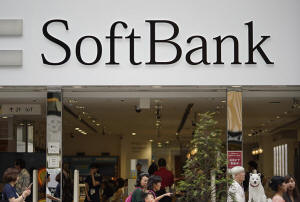Trump administration vying to own a big stake in Intel after SoftBank's
$2 billion bet on company
[August 20, 2025] By
MICHAEL LIEDTKE and ELAINE KURTENBACH
SAN FRANCISCO (AP) — U.S. Commerce Secretary Howard Lutnick on Tuesday
confirmed the U.S. government is vying for a 10% stake in Silicon Valley
pioneer Intel in an unusual deal that would deepen the Trump
administration’s financial ties with major computer chip manufacturers
and punctuate a dramatic about-face from the president’s recent push to
oust the company’s CEO.
The ambitions that Lutnick confirmed in a televised interview with CNBC
came the day after various news outlets reported on the negotiations
between the Trump administration and Intel. The investment would be made
by converting federal government grants previously pledged under
President Joe Biden's administration into a bushel of Intel stock that
would turn the U.S. government into one of the company's largest
shareholders.
“We think America should get the benefit of the bargain,” Lutnick told
CNBC as he explained why President Donald Trump is pushing for the deal.
“It's obvious that it's the right move to make.”
Intel declined to comment on the negotiations with the Trump
administration.
The notion of the U.S. government holding a huge stake in Intel would
have seemed inconceivable back in the company's heyday when its
processors were powering a personal computer boom that began in the
mid-1970s. But Intel has been mired in tough times after missing mobile
computing era unleashed by the iPhone’s 2007 debut.

Intel has fall even farther behind in recent years during an artificial
intelligence craze that has been a boon for two of its once-smaller
rivals, Nvidia and Advanced Micro Devices. The Trump administration is
hitching a ride on their success by imposing a 15% commission on their
sales of their chip sales in China in exchange for their export
licenses. Those fees are expected to translate into billions of dollars
in additional government revenue.
The U.S. government's negotiations to become a major Intel shareholder
are coming on a heels of a $2 billion investment Japanese technology
giant SoftBank Group disclosed late Monday that it plans to make in the
Santa Clara, California, company. Softbank is accumulating its 2% stake
in Intel at $23 per share — a slight discount from the stock's price
when its investment was announced.
Intel's shares surged nearly 7% to close at $25.31 on the news of
Softbank's big bet on Intel, coupled with Trump's designs on the
company.
SoftBank invests in an array of companies that it sees as holding
long-term potential. It has been stepping up investments in the United
States since Trump returned to the White House. In February, its
chairman Masayoshi Son joined Trump, Sam Altman of OpenAI and Larry
Ellison of Oracle in announcing a major investment of up to $500 billion
in a project to develop artificial intelligence called Stargate.
“Semiconductors are the foundation of every industry, Son said in a
statement. ”This strategic investment reflects our belief that advanced
semiconductor manufacturing and supply will further expand in the United
States, with Intel playing a critical role.”
Trump's interest in Intel is also being driven by his desire to boost
chip production in the U.S., which has been a focal point of the trade
war that he has been waging throughout the world since he returned to
the White House earlier this year for his second term in office. “We
want Intel to be successful in America,” Lutnick said during his CNBC
interview.
[to top of second column] |

The logo of Japanese mobile provider SoftBank is seen at its shop in
Tokyo on June 14, 2018. (AP Photo/Shuji Kajiyama, File)
 Boosting domestic production of
computer chips also ranked high on the Biden administration's
agenda, which resulted in the 2022 passage of the CHIPS and Science
Act.
Intel was among the biggest beneficiaries of the program, but it
hasn't been able to revive its fortunes while falling behind on
construction projects spawned by the CHIPS program. The company has
received about $2.2 billion of the $7.8 billion pledged under the
incentives program — money that Lutnick derided as a “giveaway” that
would better serve U.S. taxpayers if it's turned into Intel stock,
which he said would be in the form of non-voting shares so the
government wouldn't be able to use the stake to sway how the company
is managed.
But Intel's ongoing struggles also means the U.S. government is
taking on a risky investment. The company is in the midst of its
latest turnaround attempt under CEO Lip-Bu Tan, who was hired in
March to shake things up. Tan’s turnaround effort so far has been
focused on a cost-cutting spree that is gutting the company’s
workforce and further delaying construction on a chip plant in Ohio
that has been in the works since 2022.
Intel’s market value is hovering around $110 billion, only a slight
uptick from where it was when Tan arrived and leaving it more than
60% below its peak reached about a quarter-century ago during the
early phase of the internet boom.
In another strange twist to the new alliance, President Donald Trump
had demanded that Tan resign in an August 7 post spurred by concerns
about investments that Tan had made in China chipmakers while he was
working as a venture capitalist.
But Trump backed off after the Malyasia-born Tan professed his
allegiance to the U.S. in a public letter to Intel employees and
went to the White House to meet with the president, who applauded
the Intel CEO for having an “amazing story.” That truce apparently
sparked the negotiations that may culminate in the U.S. government
owning a chunk of Intel.

Although rare, it’s not unprecedented for the U.S. government to
become a significant shareholder in a prominent company. One of the
most notable instances occurred during the Great Recession in 2008
when the government injected nearly $50 billion into General Motors
in return for a roughly 60% stake in the automaker at a time it was
on the verge of bankruptcy. The government ended up with a roughly
$10 billion loss after it sold its stock in GM.
—-
Kurtenbach reported from Bangkok.
All contents © copyright 2025 Associated Press. All rights reserved
 |